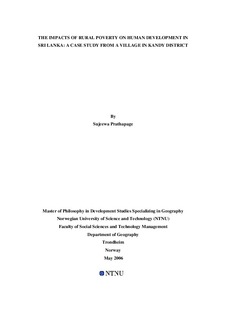The impact of rural poverty on human development in Sri Lanka: A case study from a village in Kandy District
Master thesis
Permanent lenke
http://hdl.handle.net/11250/265266Utgivelsesdato
2006Metadata
Vis full innførselSamlinger
- Institutt for geografi [1097]
Sammendrag
The study has examined the impacts of rural poverty on human development in Sri Lanka. Recently, human development became one of the most important facts of the development process. Meanwhile it is obvious that the two concepts of ‘human development’ and ‘poverty’have a close relationship. Therefore it is important to identify this relationship to overcome the poverty and increase the quality of human development. When the poverty incident is high, it automatically leads to human poverty and adversely affects human development. Sri Lanka has paid attention to overcome the problem of poverty since her independence, but still there are considerable amount of the population living below the national poverty line.
This research focuses on key questions regarding rural poverty and human development in Sri Lanka. The main objective of the research is to explore the relationship between the poverty and the human development situation of the selected study area. The study used both quantitative and qualitative research method. Also relevant data for the study were gathered from the secondary as well as primary sources. The main primary data collection methods were questionnaire survey, household interviews and key informant interviews.
To address the human development perspective of poverty, this research used Amartya Sen’s capability approach as the main theoretical approach and livelihoods approach as a tool to make the capability approach operational.
The village Madugalla (North) is located in the Udadumbara Divisional Secretariat Division in Kandy District and it is a remote and rural village. Most of the villagers’ main economic activity is agriculture and at the moment they have faced a number of difficulties due to unfavourable climatic conditions of the area. This situation adversely influenced people’s living standard. Due to this situation, to escape poverty and secure survival, they used various types of livelihoods strategies. But the study revealed that most of these livelihood strategies are not sustainable. Also in terms of assets they are in a vulnerable situation. This situation has influenced their present poverty and low human development condition and deprivation of more valuable capabilities.
The present situation of the village is a result of number of factors which directly or indirectly affect the rural economy in Sri Lanka. The study found that the main reason for their poverty situation is low income. Low income is connected to the employment situation of the village. In terms of the Human development situation the lack of educational attainment of the elderly people of the village has negatively affected their present living standard.
Also the study focused on the evaluation of present poverty alleviation program (Samurdhi) in peoples’ perspective. The result shows that many of the people do not have a trust on the program’s potential to overcome their poverty situation. It seems that many people use the benefits they receiving form the Samurdhi only as a way of survival. Those who try to overcome the poverty situation through the Samurdhi program are limited.
Further peoples’ personal views on poverty and their plans to overcome poverty situation and upgrade their human development were examined through the interviews. The final result revealed that many people don’t have any clear idea about poverty. But according to their ideas they have experienced poverty in many ways. Many of them expressed poverty as lack of basic needs. Also they have no any reliable plans to overcome the problem.
